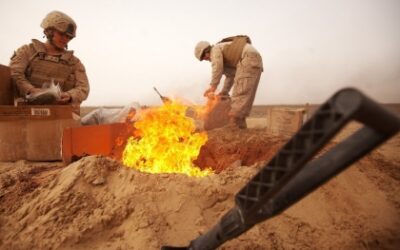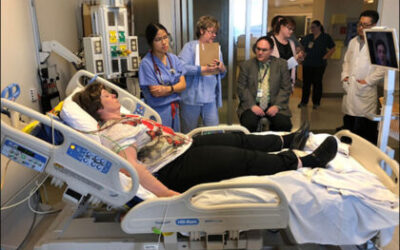BOSTON — For three decades, hypertrophic cardiomyopathy has basically been considered to be a genetic disease. The cause was believed to be variants in individual genes encoding cardiac sarcomere proteins. But that is changing, however, according to a review published...
VA Liquid Biopsy Study Aims to Screen 10,000 Veterans for Cancer
Veterans comprise nearly one-third of the participants in a major study evaluating a multi-cancer, early-detection blood test.
Telemedicine Effective for Parenteral Chemotherapy Administration at VAMC
With patients in rural Nebraska who have trouble accessing the primary campus in Omaha, the VA Affairs Nebraska Western Iowa Health Care System (VA-NWIHCS) is using teleoncology and remote chemotherapy services to expand care to those veterans.
VA Tries to Address Societal Factors Leading to Veteran Suicides
For decades, VA’s response to preventing veteran suicide has been focused almost exclusively on healthcare, specifically mental healthcare.
Medications Might Skew Testing in One-Third of Older Vets With Hypothyroidism
Clinicians can find it difficult to manage hypothyroidism in older veterans, who tend to have a greater likelihood of adverse effects because of comorbidities, polypharmacy or both.
Senate Changes Spread Out PACT Act Implementation Over Years
When Honoring Our Promise to Address Comprehensive Toxics (PACT) Act passed the House in March, it was expected to be a very hard sell in the Senate.
COVID-19 Pandemic Reduced Prostate Cancer Biopsies Among VA Patients
The COVID-19 pandemic had a negative effect on prostate cancer screening and diagnosis rates among veterans, but no racial discrepancies were identified, according to a new study.
Veterans With CLL/SLL Have Suboptimal Adherence to New Therapies
Suboptimal adherence to new therapies for chronic lymphocytic leukemia (CLL)/small lymphocytic leukemia (SLL), as well as related costs and healthcare resource use, demonstrate unmet needs in real-world treatment of the blood cancers, according to a new review.
Military/VA Search for New, Nonopioid Methods to Combat Chronic Pain
The last decade has seen health systems the world over shift away from using opioids for pain management. First there was the too-slow understanding that opioids are addictive and were being massively over-prescribed.
Depression Can Affect Dual-Task Walking in Multiple Sclerosis
Dual-task walking (DTW) can be a complex process for multiple sclerosis patients. A new study looks at what functions it requires.
MS Patients With RRMS Have More Anxiety Than Those With PMS
Multiple sclerosis patients in general appear to have higher rates of anxiety than the general population, but it remains unclear how much their disease course affects that response.
Comorbidities Predict ED Use by Veterans With MS
Would addressing comorbidities in multiple sclerosis patients help reduce use of all-cause emergency services?
Veterans Study: Risk of Long COVID-19 Reduced Only Slightly by Vaccination
Despite vaccinations, improved treatments and generally milder symptoms associated with omicron and its subvariants, COVID-19 continues to be a major public health concern and source of uncertainty.
VA Researchers Identify Key Factor in ACCORD’s Increased Mortality
Optimal diabetes management requires striking a careful balance. Over time, high blood glucose levels impair cardiovascular function, leading to delayed wound healing, heart disease and elevated risk of stroke.
Is Heart Rate Variation an Accurate Biomarker for PTSD?
Could heart rate variability be an indicator of when a form of transcranial magnetic stimulation would be effective in treating post-traumatic stress disorder?
Pandemic Worsened Outcomes of Out-of-Hospital Cardiac Arrest
Outcomes of out-of-hospital cardiac arrest appears to have worsened, not only nationally but also at the state level, according to a new study focusing on Texas.
Height Might Be a Risk Factor for Several CV Conditions
Height appears to be an unrecognized non-modifiable risk factor for several common conditions in adults, according to a study using data from the VA Million Veteran Program.
Economic Burden of PTSD Is ‘Staggering,’ New Treatments Needed
PTSD can have a profound effect on quality of life and emotional well-being. Symptoms such as nightmares, difficulty sleeping or concentrating, as well as thoughts of self-harm can continue or reemerge throughout life.
Increased Risk of Cardiovascular Mortality in U.S. Veterans Linked to Over- and Under-Treatment With Thyroid Hormones
Both over-treatment and under-treatment with synthetic thyroid hormones are associated with an increased risk of cardiovascular mortality in U.S. veterans, according to a new study.
Prescribing of Antipsychotic Medications for Dementia Dropped Overall at
VHA nursing homes are prescribing fewer antipsychotic and anxiolytic (anti-anxiety) medications for dementia patients, but the overall prescribing of other psychotropic and opioid medications increased, according to a new study.
Arkansas VAMC Illuminates Bladder Cancer Using Blue Light Cystoscopy
Early-stage cancers can be very challenging to see, but finding them before they advance provides the best chance for curative treatment with the fewest complications.
VA Researcher Focuses on How to Prevent Staff Burnout at VA
For the past five years, Kara Zivin, PhD, MS, MA, has been “chasing burnout,” working to understand what causes it, how to measure it and what are the truly impactful measures that a healthcare system can take to combat it.
Comorbidities Affect When Adjuvant Chemotherapy Is Optimal in NSCLC
While veterans with locoregional non-small cell lung cancer (NSCLC) might find adjuvant chemotherapy beneficial, the risks might outweigh the benefit for some of them.
Survival Affected by Lack of Equitable Access to Pre-Operative NSCLC Care
The VHA appears to fall short in providing equitable access to pre-operative care, which is associated with worse short- and long-term outcomes in clinical stage I non-small-cell lung cancer (NSCLC), according to a recent report.
VA Frailty Index Identifies Older NSCLC Patients at High Risk
The VA’s Frailty Index (VA-FI) was created to identify patients at high risk of unfavorable outcomes. A new study sought to determine how it works with older patients with non-small cell lung cancer (NSCLC).
HCM Management Strategies Lower Morbidity, Mortality Among Patients
New treatment guidelines endorsed highly effective hypertrophic cardiomyopathy management strategies, saying those have altered clinical course and substantially lowered mortality and morbidity rates.
Guidelines Call for Multimodal Imaging to Accurately Diagnose HCM
Multimodal imaging is crucial for the diagnosis and care of patients with hypertrophic cardiomyopathy (HCM), according to new guidelines from the American Society of Echocardiography.
Demographics of Hypertrophic Cardiomyopathy Patients Appear to Be Changing
The typical hypertrophic cardiomyopathy patient appears to have changed somewhat, according to a new study, which points out that “clinicians are encountering a phenotype of hypertrophic cardiomyopathy evolving from the disease recognized several years ago.”
VHA National Telestroke Program Uses Technology to Improves Acute Stroke Care
Prompt access to specialized care is critical to limiting the damage caused by a stroke.
VA Adds Nine Rare Cancers to Presumed Service-Connected Disabilities
Nine new rare respiratory cancers are now on the VA’s list of presumed service-connected disabilities for certain veterans exposed to fine particulate matter during military service.






